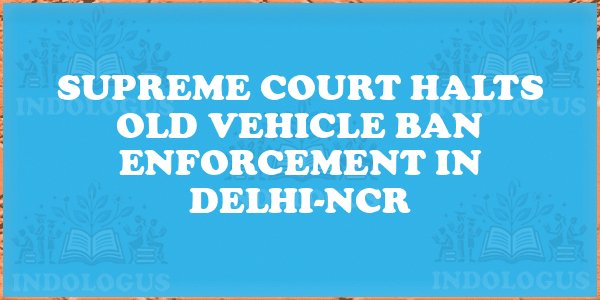The Supreme Court’s recent decision to temporarily stop the enforcement of the ban on older vehicles in the Delhi-National Capital Region (NCR) has sparked a debate on balancing environmental protection with citizens’ rights through technology-driven policies.
Overview
The Supreme Court has provided interim relief to vehicle owners in Delhi-NCR by halting the immediate ban on diesel vehicles older than 10 years and petrol vehicles older than 15 years. This decision is pending a review of the plea filed by the Delhi government.
Background of the Ban
- National Green Tribunal’s Order: In 2015, the NGT imposed a blanket ban on older vehicles in Delhi-NCR to combat severe air pollution levels.
- Supreme Court’s Uphold: The Supreme Court upheld this ban in 2018, making it legally binding.
Delhi Government’s Perspective
The Delhi government argues that the age-based ban is outdated and unfair, proposing a technology-driven policy based on actual emissions, advancements in emission standards, and stricter monitoring.
Proposed Policy Inclusions:
- Actual emission levels consideration
- Vehicle mileage and condition assessment
- Regular fitness tests implementation
- Retrofitting options like CNG or electric conversion
Requests to the Court
- Scientific Study: Directing the Centre or CAQM to conduct a study on the ban’s relevance
- Policy Creation: Developing a balanced policy respecting both the environment and citizens’ rights
Significance of the Interim Order
- No Coercive Action: Owners of older vehicles are temporarily safeguarded from penalties or seizures.
- Implications: The case highlights the need for legal frameworks to adapt to technological advancements and societal needs.
Key Takeaways for Competitive Exams
- Understanding the balance between environmental governance and individual rights
- Role of judicial review in modifying existing policies
- Importance of evidence-based policymaking in India
- Relevance to exam topics like Environment & Ecology, Polity, Science & Tech, and Governance



